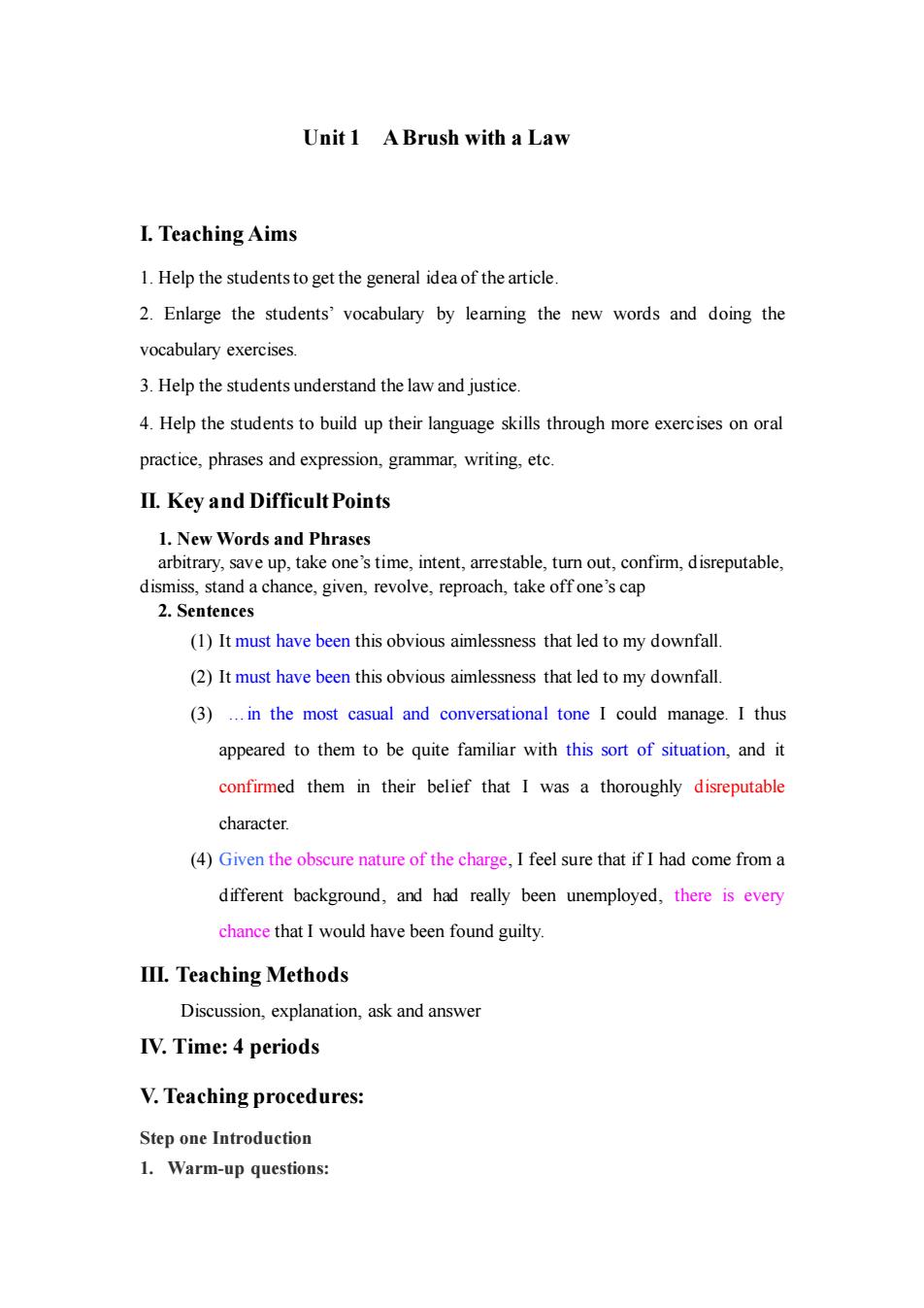
Unit 1 A Brush with a Law I.Teaching Aims 1.Help the studentsto get the general idea of the article. 2.Enlarge the students'vocabulary by learning the new words and doing the vocabulary exercises 3.Help the students understand the law and justice. 4.Help the students to build up their language skills through more exercises on oral practice,phrases and expression,grammar,writing.etc II.Key and Difficult Points 1.New Words and Phrases dismiss,stand a chance,given,revolve,reproach,take offone's cap 2.Sentences (1)It must have been this obvious aimlessness that led to my downfall. (2)It must have been this obvious aimlessness that led to my downfall. (3)...in the most casual and conversational tone I could manage.I thus appeared to them to be quite familiar with this sort of situation,and it confirmed them in their belief that I was a thoroughly disreputable character. (4)Given the obscure nature of the charge,I feel sure that if I had come from a different background,and had really been unemployed,there is every chance that I would have been found guilty. III.Teaching Methods Discussion,explanation,ask and answer IV.Time:4 periods V.Teaching procedures: Step one Introduction 1.Warm-up questions:
Unit 1 A Brush with a Law I. Teaching Aims 1. Help the students to get the general idea of the article. 2. Enlarge the students’ vocabulary by learning the new words and doing the vocabulary exercises. 3. Help the students understand the law and justice. 4. Help the students to build up their language skills through more exercises on oral practice, phrases and expression, grammar, writing, etc. II. Key and Difficult Points 1. New Words and Phrases arbitrary, save up, take one’s time, intent, arrestable, turn out, confirm, disreputable, dismiss, stand a chance, given, revolve, reproach, take off one’s cap 2. Sentences (1) It must have been this obvious aimlessness that led to my downfall. (2) It must have been this obvious aimlessness that led to my downfall. (3) …in the most casual and conversational tone I could manage. I thus appeared to them to be quite familiar with this sort of situation, and it confirmed them in their belief that I was a thoroughly disreputable character. (4) Given the obscure nature of the charge, I feel sure that if I had come from a different background, and had really been unemployed, there is every chance that I would have been found guilty. III. Teaching Methods Discussion, explanation, ask and answer IV. Time: 4 periods V. Teaching procedures: Step one Introduction 1. Warm-up questions:
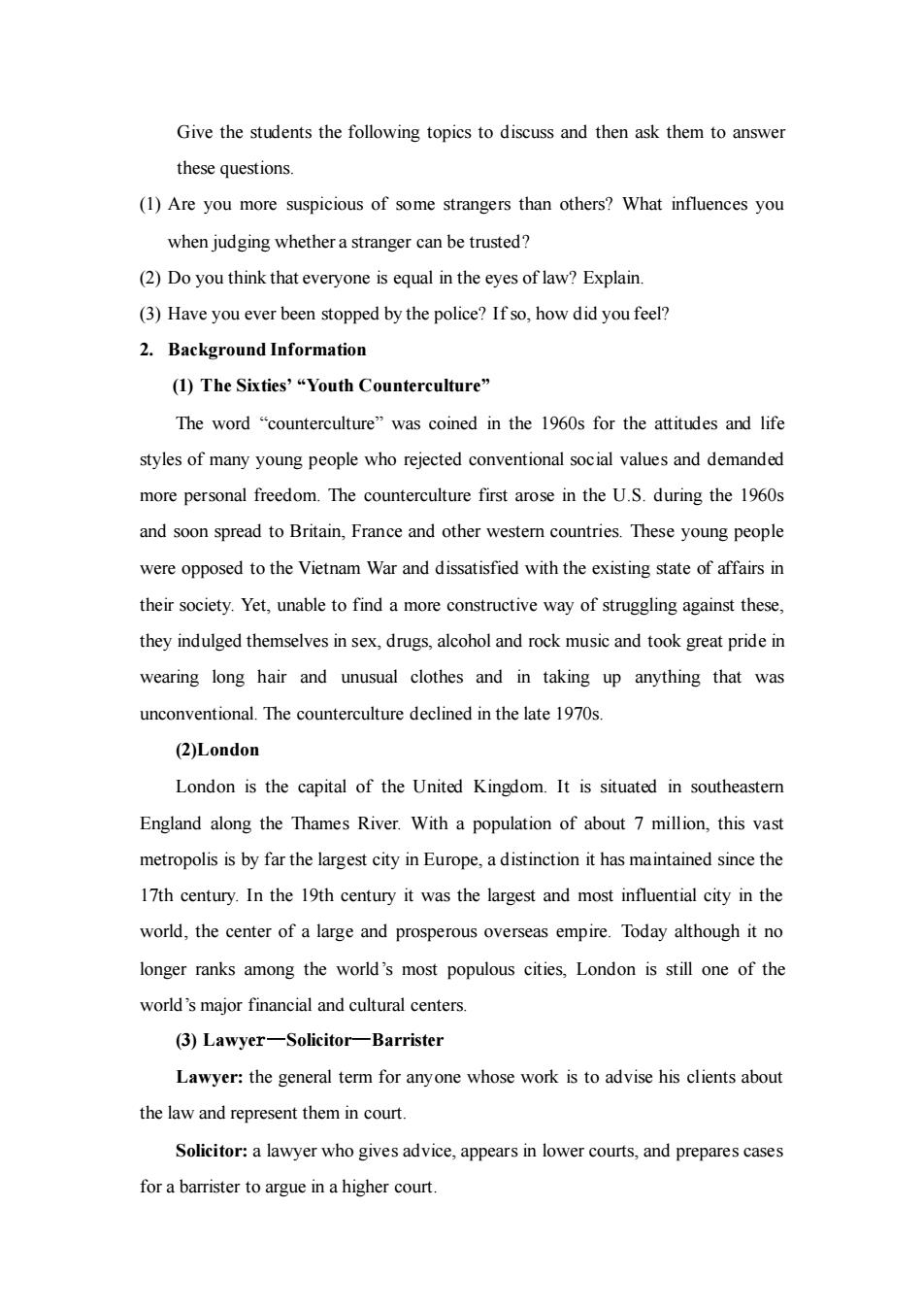
Give the students the following topics to discuss and then ask them to answer these questions. (1)Are you more suspicious of some strangers than others?What influences you when judging whether a stranger can be trusted? (2)Do you think that everyone is equal in the eyes of law?Explain. (3)Have you ever been stopped by the police?Ifso,how did you feel? 2.Background Information (1)The Sixties'"Youth Counterculture" The word "counterculture"was coined in the 1960s for the attitudes and life styles of many young people who rejected conventional social values and demanded more personal freedom.The counterculture first arose in the U.S.during the 1960s and soon spread to Britain,France and other western countries.These young people were opposed to the Vietnam War and dissatisfied with the existing state of affairs in their society.Yet,unable to find a more constructive way of struggling against these. they indulged themselves in sex,drugs,alcohol and rock music and took great pride in wearing long hair and unusual clothes and in taking up anything that was unconventional.The counterculture declined in the late 1970s. (2)London London is the capital of the United Kingdom.It is situated in southeastern England along the Thames River.With a population of about 7 million,this vast metropolis is by far the largest city in Europe,a distinction it has maintained since the 17th century.In the 19th century it was the largest and most influential city in the world,the center of a large and prosperous overseas empire.Today although it no longer ranks among the world's most populous cities,London is still one of the worlds major financial and cultural centers. (3)Lawyer-Solicitor-Barrister Lawyer:the general term for anyone whose work is to advise his clients about the law and represent them in court. Solicitor:a lawyer who gives advice,appears in lower courts,and prepares cases for a barrister to argue in a higher court
Give the students the following topics to discuss and then ask them to answer these questions. (1) Are you more suspicious of some strangers than others? What influences you when judging whether a stranger can be trusted? (2) Do you think that everyone is equal in the eyes of law? Explain. (3) Have you ever been stopped by the police? If so, how did you feel? 2. Background Information (1) The Sixties’ “Youth Counterculture” The word “counterculture” was coined in the 1960s for the attitudes and life styles of many young people who rejected conventional social values and demanded more personal freedom. The counterculture first arose in the U.S. during the 1960s and soon spread to Britain, France and other western countries. These young people were opposed to the Vietnam War and dissatisfied with the existing state of affairs in their society. Yet, unable to find a more constructive way of struggling against these, they indulged themselves in sex, drugs, alcohol and rock music and took great pride in wearing long hair and unusual clothes and in taking up anything that was unconventional. The counterculture declined in the late 1970s. (2)London London is the capital of the United Kingdom. It is situated in southeastern England along the Thames River. With a population of about 7 million, this vast metropolis is by far the largest city in Europe, a distinction it has maintained since the 17th century. In the 19th century it was the largest and most influential city in the world, the center of a large and prosperous overseas empire. Today although it no longer ranks among the world’s most populous cities, London is still one of the world’s major financial and cultural centers. (3) Lawyer—Solicitor—Barrister Lawyer: the general term for anyone whose work is to advise his clients about the law and represent them in court. Solicitor: a lawyer who gives advice, appears in lower courts, and prepares cases for a barrister to argue in a higher court
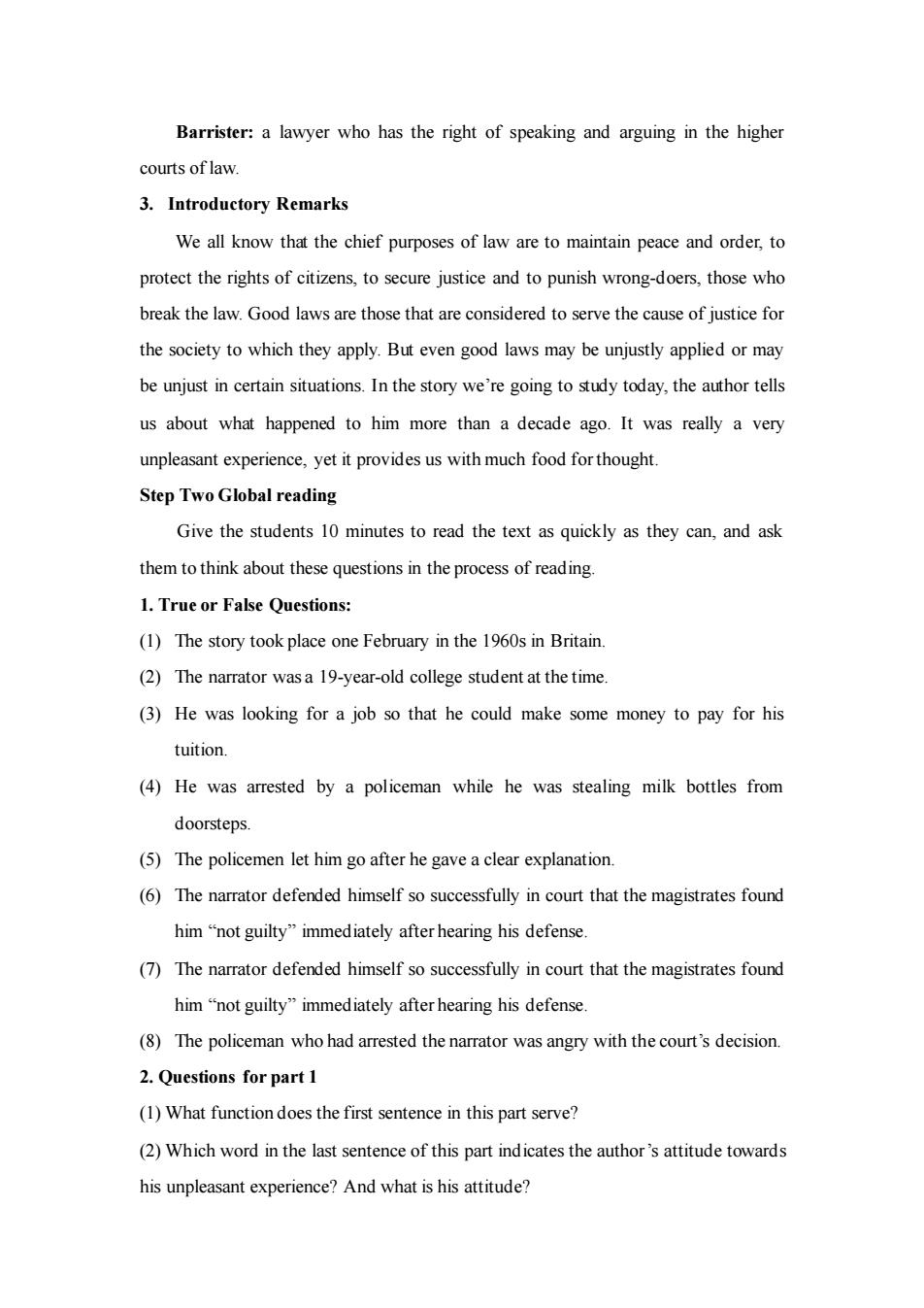
Barrister:a lawyer who has the right of speaking and arguing in the higher courts of law. 3.Introductory Remarks We all know that the chief purposes of law are to maintain peace and order,to protect the rights of citizens,to secure justice and to punish wrong-doers,those who break the law.Good laws are those that are considered to serve the cause of justice for the society to which they apply.But even good laws may be unjustly applied or may be unjust in certain situations.In the story we're going to study today.the author tells us about what happened to him more than a decade ago.It was really a very unpleasant experience,yet it provides us with much food for thought. Step Two Global reading Give the students 10 minutes to read the text as quickly as they can,and ask them to think about these questions in the process of reading. 1.True or False Questions: (1)The story took place one February in the 1960s in Britain. (2)The narrator wasa 19-year-old college student at the time. (3)He was looking for a job so that he could make some money to pay for his tuition. (4)He was arrested by a policeman while he was stealing milk bottles from doorsteps. (5)The policemen let him go after he gave a clear explanation (6)The narrator defended himself so successfully in court that the magistrates found him"not guilty"immediately afterhearing his defense. (7)The narrator defended himself so successfully in court that the magistrates found him"not guilty"immediately after hearing his defense (8)The policeman who had arrested the narrator was angry with the court's decision. 2.Questions for part 1 (1)What function does the first sentence in this part serve? (2)Which word in the last sentence of this part indicates the author's attitude towards his unpleasant experience?And what is his attitude?
Barrister: a lawyer who has the right of speaking and arguing in the higher courts of law. 3. Introductory Remarks We all know that the chief purposes of law are to maintain peace and order, to protect the rights of citizens, to secure justice and to punish wrong-doers, those who break the law. Good laws are those that are considered to serve the cause of justice for the society to which they apply. But even good laws may be unjustly applied or may be unjust in certain situations. In the story we’re going to study today, the author tells us about what happened to him more than a decade ago. It was really a very unpleasant experience, yet it provides us with much food for thought. Step Two Global reading Give the students 10 minutes to read the text as quickly as they can, and ask them to think about these questions in the process of reading. 1. True or False Questions: (1) The story took place one February in the 1960s in Britain. (2) The narrator was a 19-year-old college student at the time. (3) He was looking for a job so that he could make some money to pay for his tuition. (4) He was arrested by a policeman while he was stealing milk bottles from doorsteps. (5) The policemen let him go after he gave a clear explanation. (6) The narrator defended himself so successfully in court that the magistrates found him “not guilty” immediately after hearing his defense. (7) The narrator defended himself so successfully in court that the magistrates found him “not guilty” immediately after hearing his defense. (8) The policeman who had arrested the narrator was angry with the court’s decision. 2. Questions for part 1 (1) What function does the first sentence in this part serve? (2) Which word in the last sentence of this part indicates the author’s attitude towards his unpleasant experience? And what is his attitude?
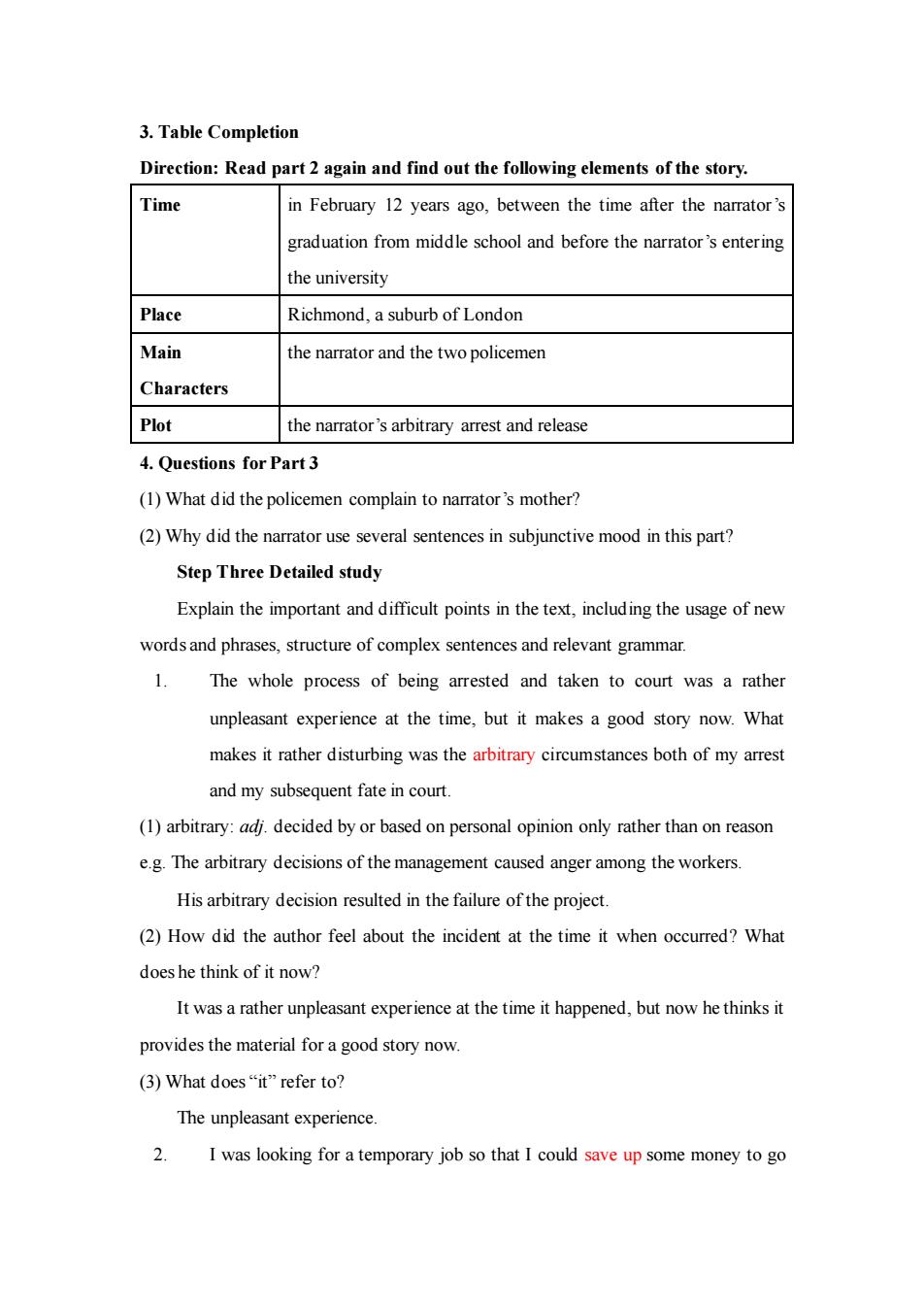
3.Table Completion Direction:Read part 2 again and find out the following elements of the story. Time in February 12 years ago,between the time after the narrator's graduation from middle school and before the narrator's entering the university Place Richmond,a suburb of London Main the narrator and the two policemen Characters Plot the narrator's arbitrary arrest and release 4.Questions for Part 3 (1)What did the policemen complain to narrator's mother? (2)Why did the narrator use several sentences in subjunctive mood in this part? Step Three Detailed study Explain the important and difficult points in the text,including the usage of new words and phrases,structure of complex sentences and relevant grammar. 1. The whole process of being arrested and taken to court was a rather unpleasant experience at the time,but it makes a good story now.What makes it rather disturbing was the arbitrary circumstances both of my arrest and my subsequent fate in court (1)arbitrary:ad.decided byor based on personal opinion only rather than on reason e.g.The arbitrary decisions of the management caused anger among the workers. His arbitrary decision resulted in the failure of the project. (2)How did the author feel about the incident at the time it when occurred?What does he think of it now? It was a rather unpleasant experience at the time it happened,but now he thinks it provides the material for a good story now. (3)What does“it”refer to2 The unpleasant experience. 2.I was looking for a temporary job so that I could save up some money to go
3. Table Completion Direction: Read part 2 again and find out the following elements of the story. Time in February 12 years ago, between the time after the narrator’s graduation from middle school and before the narrator’s entering the university Place Richmond, a suburb of London Main Characters the narrator and the two policemen Plot the narrator’s arbitrary arrest and release 4. Questions for Part 3 (1) What did the policemen complain to narrator’s mother? (2) Why did the narrator use several sentences in subjunctive mood in this part? Step Three Detailed study Explain the important and difficult points in the text, including the usage of new words and phrases, structure of complex sentences and relevant grammar. 1. The whole process of being arrested and taken to court was a rather unpleasant experience at the time, but it makes a good story now. What makes it rather disturbing was the arbitrary circumstances both of my arrest and my subsequent fate in court. (1) arbitrary: adj. decided by or based on personal opinion only rather than on reason e.g. The arbitrary decisions of the management caused anger among the workers. His arbitrary decision resulted in the failure of the project. (2) How did the author feel about the incident at the time it when occurred? What does he think of it now? It was a rather unpleasant experience at the time it happened, but now he thinks it provides the material for a good story now. (3) What does “it” refer to? The unpleasant experience. 2. I was looking for a temporary job so that I could save up some money to go
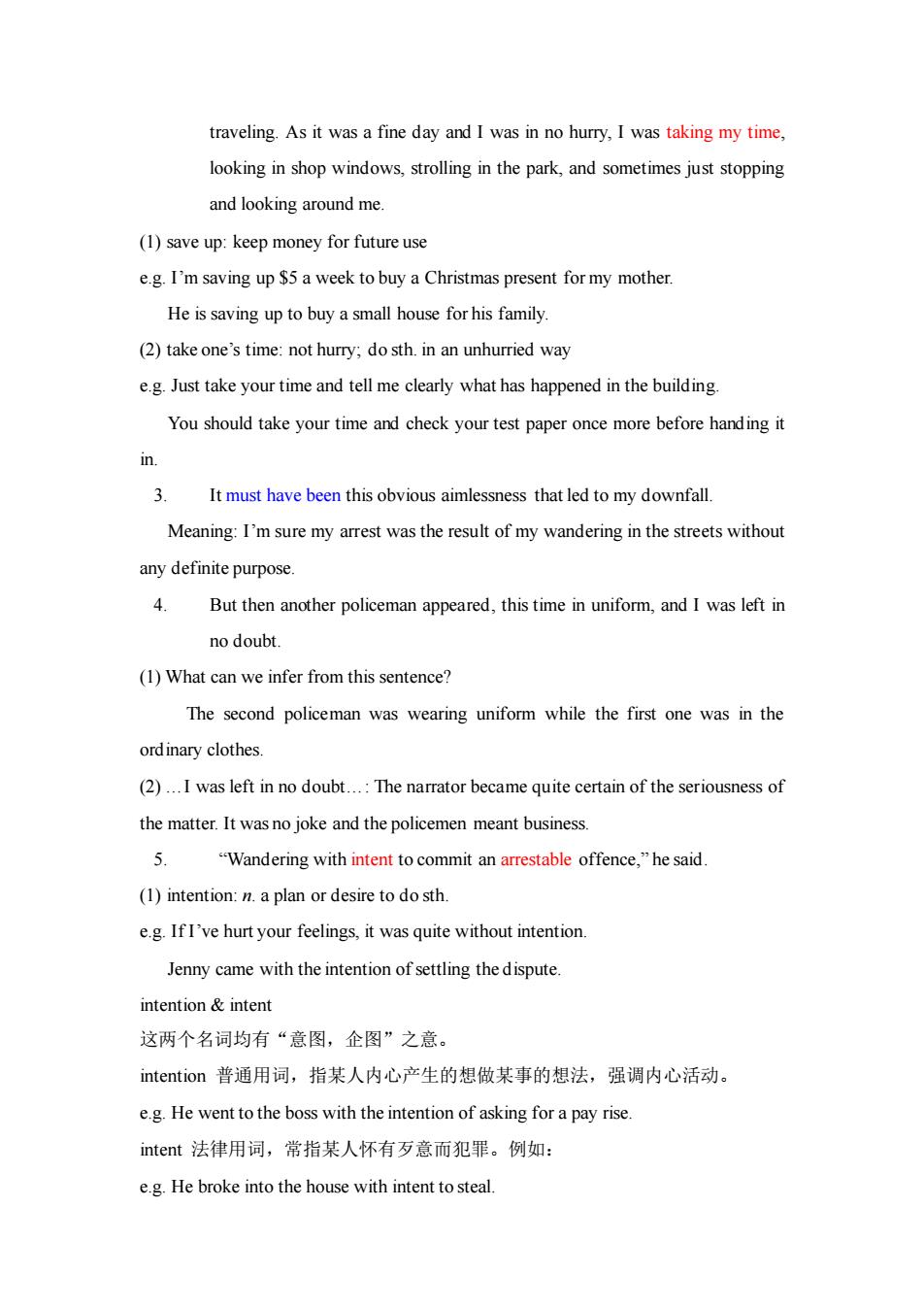
traveling.As it was a fine day and I was in no hurry,I was taking my time, looking in shop windows,strolling in the park,and sometimes just stopping and looking around me. (1)save up:keep money for future use e.g.I'm saving up $5 a week to buy a Christmas present for my mother. He is saving up to buy a small house for his family. (2)take one's time:not hurry;dosth.in an unhurried way e.g.Just take your time and tell me clearly what has happened in the building. You should take your time and check your test paper once more before handing it 3. It must have been this obvious aimlessness that led to my downfall Meaning:I'm sure my arrest was the result of my wandering in the streets without any definite purpose. But then another policeman appeared,this time in uniform,and I was left in no doubt. (1)What can we infer from this sentence? The second policeman was wearing uniform while the first one was in the ordinary clothes. (2)...I was left in no doubt..:The narrator became quite certain of the seriousness of the matter.It was no joke and the policemen meant business. 5. "Wandering with intent to commit an arrestable offence,"he said (1)intention:n.a plan or desire to dosth e.g.IfI've hurt your feelings,it was quite without intention. Jenny came with the intention of settling the dispute. intention&intent 这两个名词均有“意图,企图”之意。 intention普通用词,指某人内心产生的想做某事的想法,强调内心活动。 e.g.He went to the boss with the intention of asking for a pay rise intent法律用词,常指某人怀有歹意而犯罪。例如: e.g.He broke into the house with intent to steal
traveling. As it was a fine day and I was in no hurry, I was taking my time, looking in shop windows, strolling in the park, and sometimes just stopping and looking around me. (1) save up: keep money for future use e.g. I’m saving up $5 a week to buy a Christmas present for my mother. He is saving up to buy a small house for his family. (2) take one’s time: not hurry; do sth. in an unhurried way e.g. Just take your time and tell me clearly what has happened in the building. You should take your time and check your test paper once more before handing it in. 3. It must have been this obvious aimlessness that led to my downfall. Meaning: I’m sure my arrest was the result of my wandering in the streets without any definite purpose. 4. But then another policeman appeared, this time in uniform, and I was left in no doubt. (1) What can we infer from this sentence? The second policeman was wearing uniform while the first one was in the ordinary clothes. (2) …I was left in no doubt…: The narrator became quite certain of the seriousness of the matter. It was no joke and the policemen meant business. 5. “Wandering with intent to commit an arrestable offence,” he said. (1) intention: n. a plan or desire to do sth. e.g. If I’ve hurt your feelings, it was quite without intention. Jenny came with the intention of settling the dispute. intention & intent 这两个名词均有“意图,企图”之意。 intention 普通用词,指某人内心产生的想做某事的想法,强调内心活动。 e.g. He went to the boss with the intention of asking for a pay rise. intent 法律用词,常指某人怀有歹意而犯罪。例如: e.g. He broke into the house with intent to steal